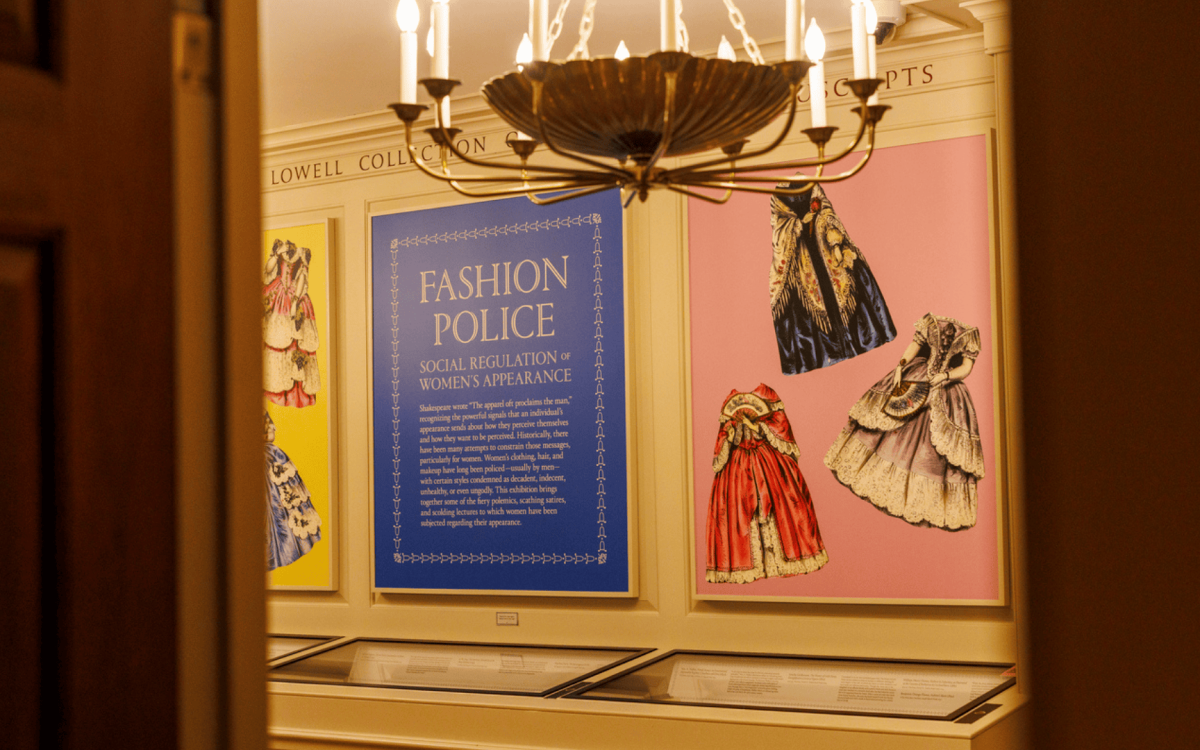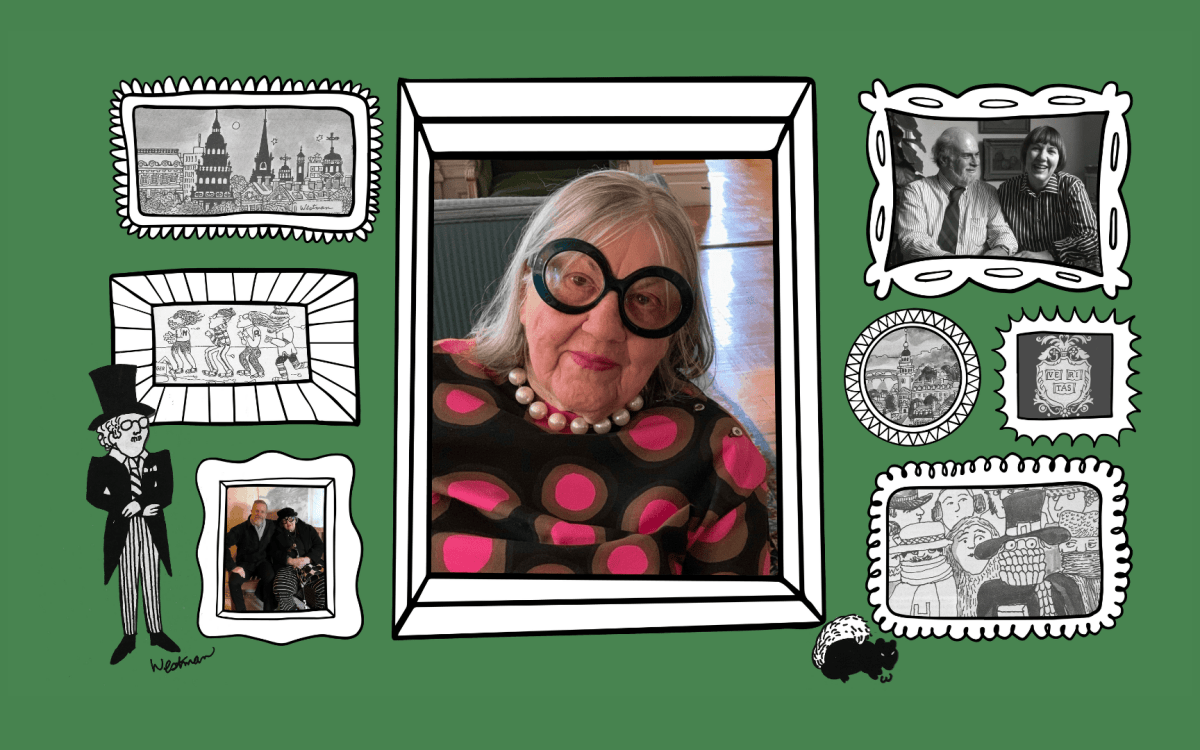Arts & Culture
-

Live fast, die young, inspire Shakespeare
Stephen Greenblatt finds a tragic strain in the life and work of Christopher Marlowe
-

Steve McQueen could lecture you, but he’s got other plans
‘I think the audience needs more, and I feel I need to give more,’ says award-winning filmmaker — presenter of this year’s Norton talks
-

Marking 100 years of Norton Lectures
Panelists reflect on ‘incredible value’ of annual series as ‘megaphone’ for artists and scholars
-

How fashion police have been walking beat for centuries
Houghton Library exhibit highlights the policing of women’s fashion since the 17th century.
-

Seeing what you see
New faculty Cécile Fromont is a visual problem solver
-

Her Cambridge iconography made her a local icon
Before New Yorker covers, Barbara Westman created colorful visions of campus as Gazette’s first staff artist
-
Isolating creativity in the brain
How — exactly — does improvisation happen? What’s involved when a musician sits down at the piano and plays flurries of notes in a free fall, without a score, without knowing much about what will happen moment to moment? Is it possible to find the sources of a creative process?
-
‘Nation-shaking’ racial, ethnic changes
Real earthquakes are slow to build and fast to erupt. Other, metaphorical, quakes, can follow the same pattern — and be just as earthshaking.
-
Scholar asks: ‘How can we know the spectator from the dance?’
When Yvonne Rainer and her fellow dancers took to the stage in the early 1960s, their performances were like nothing American audiences had ever seen. First, there were no costumes. Performers wore T-shirts, casual pants, and sneakers. In place of elaborate leaps and twirls, the dancers engaged in everyday movements like running, climbing, and even falling. And there was little to no emotional drama. The focus was on the body: unadorned, physical, and pure. Rainer — choreographer, dancer, and visionary — had sparked a revolution.
-
Seidel honored with Crystal Quill Award
Steve Seidel, the Patricia Bauman Arts in Education professor at the Harvard Graduate School of Education (HGSE), received the Crystal Quill Award from the Shakespeare Festival/LA Nov. 20 in Los Angeles. The Shakespeare Festival/LA is an arts organization that uses professional theater traditions to “enchant, enrich, and build community.”
-
Author McGowan is honored as ‘2008 Harvard Humanist of the Year’
Can parents raise moral children without religion? Greg Epstein M.T.S. ’07 thinks so. He’s the Humanist chaplain at Harvard, and has just finished writing a book due out next fall. Its title: “Good Without God.”
-
Class, war, and discrimination in 1812 Korea
Sun Joo Kim’s laugh is as easy as it is infectious. Her cheery nature no doubt comes in handy when she’s conducting her intensive research in three complex languages.
-
‘The health of poetry’
As a graduate student at Oxford, Gwyneth Lewis wrote her dissertation on 18th century literary forgery. But as a working poet for three decades — and this year as a Radcliffe Fellow — she is as far from that fraud as conceivable.
-
Patricia Cornwell endows conservationist at Straus Center
Harvard Art Museum announced the establishment of the Patricia Cornwell Conservation Scientist position at the museum’s Straus Center for Conservation and Technical Studies. Funded by a $1 million commitment from best-selling author Patricia Cornwell, the Cornwell Conservation Scientist will play a key role in the analytical laboratory and beyond.
-
At GSD, UPenn’s Thomas Sugrue talks about ‘civil rights and the metropolis’
For the first time in a generation, urban policy is back on the national agenda. Advocates for the nation’s cities have been thrilled by the announcement that the Obama administration will include a White House Office of Urban Policy.
-
Achebe celebrates African literature with poetry
Chinua Achebe, the esteemed Nigerian novelist and poet, delivered this year’s Distinguished African Studies Lecture at the Center for Government and International Studies (CGIS). Greeting the standing-room-only crowd in Tsai Auditorium earlier this week (Nov. 17), Achebe surprised the group by announcing that he had an unusual program in mind.
-
‘Godot’ in the bayou: Artist Chan speaks at Carpenter Center
Paul Chan is soft-spoken, but his words are heavy. Carefully chosen, they offer an insight into his reflective process and the weighty implications of his work.
-
Marla Frederick talks about faith, God, and money
Not long ago, Harvard cultural anthropologist Marla Frederick sat on a wooden bench in a slum of Kingston, Jamaica. She was interviewing local churchgoers about the Christian “prosperity gospel” often promoted by American televangelists. It offers up a simple (and controversial) idea: The more you give, the more you receive.
-
Poetry, music, death take the stage at New College Theatre
John Adams ’69, A.M. ’72 returned to Harvard on Nov. 17, where he attended a performance of his piece by Harvard’s Bach Society Orchestra (a group he led in the 1960s) at the New College Theatre.
-
Appreciating Billie Jean King’s contribution to second-wave feminism
In a stately room in the Barker Center, flanked by portraits of famous men, Billie Jean King holds court. Not physically. She’s the topic of discussion, the name on everyone’s lips. One would think this were the after party of her notorious 1973 “Battle of the Sexes” tennis match with Bobby Riggs, the match she won and changed the face of women’s sports — and feminism — forever.
-
Probing an unlikely friendship
Theirs was an unlikely friendship. One man was a black abolitionist, orator, and journalist who had been a slave from Maryland, the other a white politician from the backwoods of Kentucky, Indiana, and Illinois.
-
Falling in love with South Asian music
As a young boy, Richard Wolf, professor of music, liked to sit at the piano in his grandparents’ home and invent short musical ditties. “My grandfather would listen and shout, ‘Oh! It’s Bach! Oh, just like Mozart!’” Wolf recalled recently, with a laugh. “He was wonderfully encouraging.”
-
Puzzling through Yeats with Helen Vendler
Helen Vendler knows a thing or two about William Butler Yeats. She has authored three books on the Irish poet’s work, including her most recent volume, “Our Secret Discipline: Yeats and Lyric Form,” published in 2007.
-
Looking at race, racism through a philosophical lens
Tommie Shelby’s airy office in the Barker Center is piled with papers. His desk is a blanket of white. Books and academic journals litter the floor. The look is, in a word, chaotic. The scholar is anything but.
-
How the ‘talking machine’ allowed music and dance to cross oceans
In the late 1920s, with the advent of new technology, gramophone and “talking machine” companies were able to capture the sounds and rhythms of life in cities across the globe. From New York to Havana, Paris to Honolulu, labels like Victor, Gramophone Company, and Okeh competed to record vernacular music.
-
Houghton joins with libraries nationwide to celebrate artists’ retreat
HCL Communications It’s been said great art often grows out of tragedy — in the case of Yaddo, an artists’ retreat in upstate New York founded in 1900, tragedy spurred the creation of hundreds of great works of art.
-
The Nobel for literature: An insider’s view
One of Per Wästberg’s best times as a college student in the 1950s was the night he got locked in Widener Library. “I got so enthralled [in the stacks], the library closed and I couldn’t get out,” Wästberg said with a laugh, noting that the floor of the library was nicer than his room at Adams House.
-
Judaica Division concert includes world premiere of sax concerto
As part of its celebration of the 60th anniversary of the founding of Israel, the Harvard College Library’s Judaica Division will host the world premiere of a saxophone concerto composed by an award-winning Israeli composer Nov. 2, at 3 p.m. at Sanders Theatre.
-
Dracula, Romanian revolution onstage at A.R.T.
Thirteen men and women stand in a semicircle. Several of them are wearing hammer and sickle-shaped headdresses. Some are carrying wrenches; others, flowers. They are all singing the refrain “Drac-u-laaa.” And in the center of it all, there is a man, slowly turning, pretending to draw a cape to the tip of his nose.
-
Are boundaries between ‘the arts’ irrelevant?
What does Harpo Marx’s bicycle horn have to do with Richard Wagner’s epic opera “The Ring of the Nibelung”? Everything, if you ask Daniel Albright, Ernest Bernbaum Professor of Literature. Albright, who studies the intellectual history of comparative arts, is currently at work on a book about the boundaries and overlaps between different artistic media.
-
Davis explains how he makes his operas swing
A former Harvard professor returned to campus last week to explain how he makes opera swing. Anthony Davis, a composer known for his diverse approach to music, incorporating diverse elements like jazz, improvisation, minimalism, and the Javanese gamelan (an Indonesian musical ensemble that includes gongs, xylophones, and bamboo flutes) into his work, recently discussed his unique spin on the art form in a series of talks sponsored by the W.E.B. Du Bois Institute for African and African American Research.
-
Wilson perceives social structure and culture as key causes of poverty
In speaking frankly about the seemingly implacable problems in the inner cities, Harvard University Professor William Julius Wilson traveled a road that liberals fear to tread and that conservatives tend to take. Wilson, the Lewis P. and Linda L. Geyser University Professor and an award-winning author and researcher, dissected the twin influences of culture and social structure in the persistence of youth violence, unemployment, and fragmentation of families within poor African-American communities and concluded that both factors must be considered in determining how to end the cycle of poverty.
-
Maestro Previn guides students with expertise, wit
Music great Sir André Previn’s motto, listed on his official Web site, reads, “A day without music is a wasted day.” Several Harvard students and two classical master composers put their day with the maestro to good use on Monday (Oct. 6).
-
Power of the pen in early America
In 1747, three members of the Abenaki Native American tribe and their Mohawk ally posted a petition on a wall of an English fort in the Connecticut River Valley. The paper was small, but it spoke volumes.
-
Key statistical ideas celebrate birthdays
University of Chicago statistics professor Stephen M. Stigler, a frequent visitor to Harvard, has a favorite movie — “Magic Town,” a black-and-white flick from 1947. It stars James Stewart as a pollster who discovers a magical place: a heartland town whose citizens have a range of opinions that are a near-perfect composite of the whole United States.
-
Du Bois fellow makes ‘Little Fugitive,’ take two
The wonder of Brooklyn’s iconic amusement park Coney Island as seen through the eyes of a young runaway is at the heart of the 1953 classic film “Little Fugitive” by the directing team of Ray Ashley, Morris Engel, and Ruth Orkin. What lies at the heart of Joanna Lipper’s ’94 recent remake is much darker.


